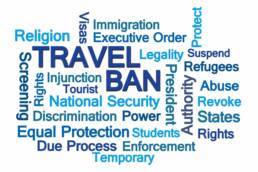President Trump’s controversial “travel ban” is back in the news. This time, the 9th Circuit Court of Appeals ruled in part against the President’s travel ban on Monday. This decision comes only days after the 4th Circuit announced that the travel ban violated constitutional protections against religious discrimination.
What does this mean? The battle over the President’s travel ban has been raging between the states and the federal government since the original executive order was issued on January 27th. It has been blocked, withdrawn, redrafted and blocked all over again, and now, it seems very likely that the Supreme Court will hear the case. The 9th Circuit ruling added a new card to the playing field. It introduced a new line of reasoning for upholding the injunction blocking Trump’s travel ban. The end result is still the same, but the reasons why are different. Just like the 4th Circuit ruling on May 25, the President is barred from enforcing a suspension on travel from six predominantly Muslim countries. He is barred from halting the U.S. refugee program, but he is allowed to conduct an internal review. The injunction was narrowed to provide the federal government an opportunity to rethink current vetting procedures.
What has changed? What has changed, is the reason why. The 4th Circuit focused primarily on constitutionally protected rights. It focused on religious discrimination, and the overall intent of the initial order. Here, the 9th Circuit took a different approach. The travel ban was faulted on two grounds. First, the court held that the ban violated U.S. immigration law by restricting entry based on nationality. Second, the court stated: “The order does not provide a rationale explaining why permitting entry of nationals from the six designated countries … would be detrimental.” The Court upheld the injunction based on existing federal law.
This is important. This is important, because now the Supreme Court will need to hear both cases. The travel ban can only be upheld if both bases for blocking the order are rejected. It is always hard to win an immigration case on constitutional grounds. The 4th Circuit decision is likely to be scrutinized by the Supreme Court, because immigration concerns are politically complex. They touch foreign relations and national sovereignty issues, and historically, the Supreme Court has been reluctant to second guess a sitting President. It is difficult to predict whether the Supreme Court will even hear the case. It is likely, but not certain. It is even more difficult to determine which way the justices will swing. Either way, the combination of the two Court of Appeal’s rulings “provides a one-two punch against the executive order” that will make it more difficult for Trump to succeed in the Supreme Court.
Berardi Immigration Law is committed to providing our clients with the most accurate and up-to-date information possible and will continue to monitor this issue closely. Be sure to check our blog frequently for more updates!
Ready to have Berardi on your side?
Whether you’re a business looking to hire or a professional hoping to relocate, immigration law can be complicated. But you don’t have to do it alone. Put our experience to work for you.



